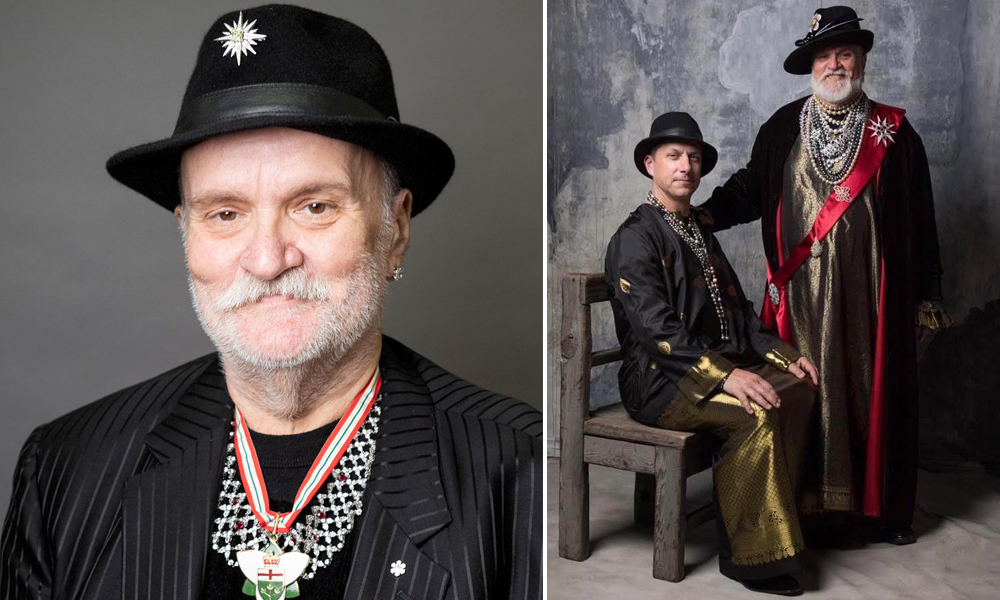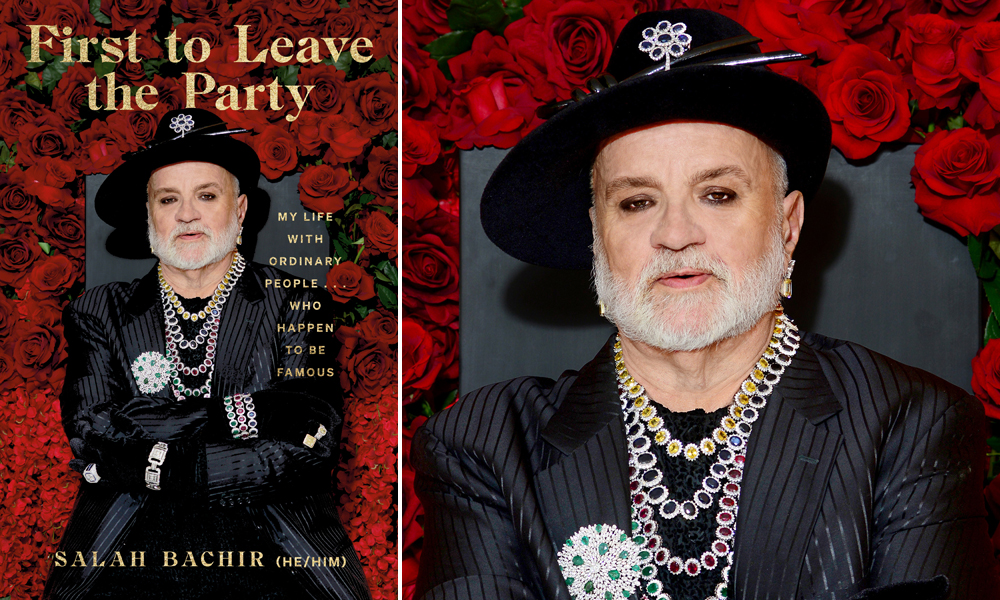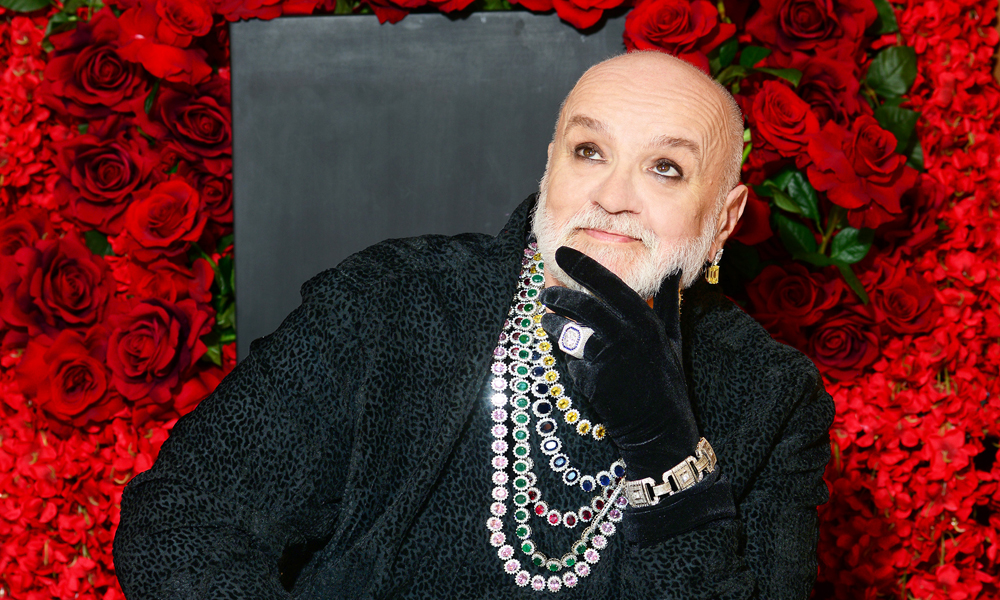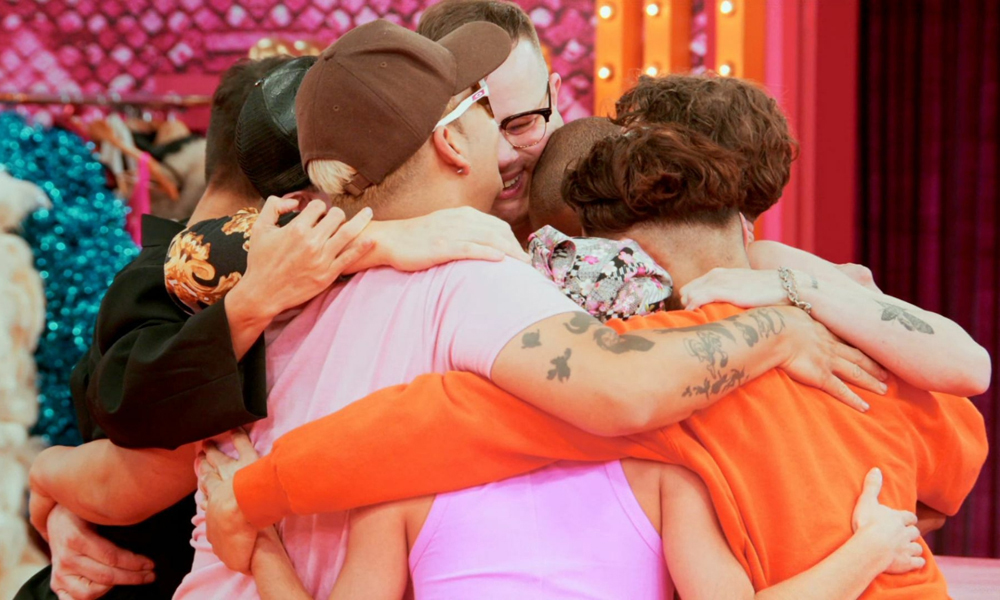We sit down with the one and only Salah Bachir as he prepares to release his memoir this fall, entitled First to Leave the Party…
By Christopher Turner
A few years ago, a friend of mine introduced me to Salah Bachir; he thought the two of us would connect on a project that Bachir was working on. Spoiler alert: we did. We instantly hit it off. Even before we met, though, I’d gleaned bits and pieces of knowledge about him, although it was more akin to a Wikipedia entry. I knew that he was a patron of the arts and a renowned philanthropist whose generosity had spilled across the country, especially to Toronto’s arts and queer community. I knew that his name appeared above the entryway of the light-filled wing added to the south elevation of the original 519 building in the heart of Toronto’s Gay Village, an expansion that opened back in 2010 and ultimately increased The 519’s event space by 45 per cent. And I definitely remembered when Bachir acted as Grand Marshal of the Toronto Pride parade back in 2016: my friends and I cheered as Bachir rode down Yonge Street wearing full Arab regalia and pearls flanked by a bevy of beautiful men waving to supporters. (Bachir also acted as Toronto Pride’s Grand Marshal back in 2005 for the festival’s 25th anniversary.)
Turns out…what I knew didn’t even scratch the surface of Salah Bachir, a man who has swanned around with Elton John and countless other celebrities and had incredible influence on Canadian film business, all of which you can read about in his upcoming memoir…but more on that later.
An activist from the beginning
Bachir was born in Lebanon on October 3, 1955, and his family immigrated to Canada 10 years later in 1965, where they settled in Toronto’s Rexdale neighbourhood. As a child, he worked hard at fitting in and was active in sports, including hockey, football and lacrosse. (BTW, he’s still a diehard NFL fan to this day.)
When Bachir was 15 years old, he picketed outside the Dominion grocery store in the Rexdale Plaza in support of US labour leader and civil rights activist Cesar Chavez and the exploited farm workers in California during the Delano grape boycott. As the story goes, he raised about $150 ($50 of which came from his father), and when Chavez made an appearance in Toronto near the end of the boycott, Bachir shyly gave the money to him, embarrassed that he hadn’t raised more. Chavez assured the young activist how much that money would mean to the migrant workers and thanked him, reminding him that it was $150 more than the cause had had before.
The heartwarming story is the obvious opening chapter of a life dedicated to fundraising and social justice. Of course, that one-man protest wasn’t his only one outside of the Dominion store. Bachir’s passion for social justice deepened in his teenage years, and he often returned to the grocery store: boycotting produce, calling attention to native rights, bringing attention to the assassination of South African apartheid activist Steve Biko, or the testing of American cruise missiles over Canada.
He studied history and political science at Waterloo University – making waves at the university newspaper, of course – and worked at his brother’s home video store, before eventually beginning his career in publishing in 1980 with the publication of the first consumer video magazine in Canada, Videomania. In 1984, he started the trade publication Premiere, and went on to co-produce the annual trade show Focus on Video, as well as helped launch several home video labels, including Disney, Universal, Vestron and Thorn EMI. In 1999, Bachir moved on to become the founding president and chair of Famous Players Media, which was ultimately acquired by Cineplex in 2005. Bachir subsequently became the president of Cineplex Media, where he was publisher of Cineplex Magazine, negotiated theatre naming rights with Scotiabank, and even co-founded the Scene loyalty card program (you might have the card sitting in your wallet right now).
His innovation, according to Marketing magazine, was to revolutionize and legitimize the in-cinema business, building blockbuster client ads and then inserting a few social justice-themed public service announcements amongst the pages. He actually got death threats for an ad he ran in 2005 that read: “‘I do’ means the same whether you are straight or gay. Let your MP know you support our Charter of Rights and Freedoms.”
The ad, seemingly simple by today’s standards but shockingly forward for the time, is just one small example of Bachir’s unwavering commitment to 2SLGBTQI+ causes. He is a proud gay man, and although he didn’t come out until later in life to some of his family, he has worked tirelessly to champion advancements and acceptance of the queer community. In fact, he is a member of the Order of Ontario and the Order of Canada for “his leadership as an entrepreneur and for his commitment to the arts and social justice, notably through Toronto’s the 519 community centre.”

Gala Salah
In 2021, Bachir retired from Cineplex… although if you know anything about Bachir, you’ll know that he’s now busier than ever, fundraising for a seemingly endless number of organizations. He could be enjoying retirement with his husband, the artist Jacob Yerex (whom he married on October 17, 2015, at The 519, in a lavish ceremony turned fundraiser that featured a performance by k.d. lang), but he is at heart a fundraising machine. This is, after all, the man who was first dubbed “Gala Salah” back in 2013 by the Globe and Mail, in reference to the hundreds of fundraising luncheons and galas he has hosted throughout the years – the annual 519 Gala in support of The 519, the Governor General’s Performing Arts Awards Gala, and the annual Salah Bachir Show in support of St. Joseph’s Health Centre Foundation, to name just a few.
There are countless accolades that speak to his entrepreneurial spirit and his passion for philanthropy. His benefactors speak highly of him, and his friends offer even more praise…even the famous ones. And there are a lot of them. There isn’t a celebrity that Bachir hasn’t met, it seems, and many of them consider him a dear friend.
“Salah Bachir is the biggest hearted philanthropist with the rock star life,” say Elton John and David Furnish.
As Bachir and I began to collaborate on our joint project, he would break out of our work chatter to show some of his eye-popping jewellery, and that gave me the opening to coax him (although it didn’t take much coaxing) to share stories on anyone and everyone he’d met, including Marlon Brando, Elizabeth Taylor, Ella Fitzgerald, Douglas Fairbanks, Andy Warhol, Norman Jewison, Atom Egoyan (my university idol) and André Leon Talley. (And that’s not even grazing the surface of his network.) He was always generous with his time, and through our increasingly regular conversations, he would continue to share the most incredible stories from his life, some of which can be found in his upcoming memoir, First to Leave the Party: My Life with Ordinary People…Who Happen to be Famous, which is set to be released by Penguin Random House on October 17. It’s an incredible read, filled with personal stories from an extraordinary life – some short, some long, some surprising, others juicy…and all incredibly fascinating.
In anticipation of the release of his must-read memoir, I sat down once again with him to chat about his inspiration for the book, pronouns, role models, combatting hate here in Canada – and what stories didn’t make the final cut of his book.
What inspired you to write First To Leave The Party?
I had a few life-threatening moments after my kidney transplant, when I got sepsis and needed an ileostomy. I wanted to write something empowering as a way to reclaim my own narrative. I was stuck in a hospital bed…with tubes coming out of me every which way. I wanted to preserve some of my history, of our communities history, and decided to write pieces on social media to share as an entertaining diversion for those who were likewise stuck or shut in during the pandemic. As I continued to post, I kept hearing from people it should be a book. And it became First to Leave the Party.
It’s one of the first books – if not the first – to feature the author’s pronouns on the cover. Can you talk a little about that decision, and normalizing discussions about gender identity and the sharing of pronouns?
I couldn’t believe it hadn’t been done before! While writing the book, I received a letter from an organization we had given money to, and it was addressed to Ms. Salah Bachir. I also kept a thank-you letter from Jeffrey Katzenberg from years ago, addressed to me as Ms. Salah Bachir, even though we had worked an event together for AIDS Project Los Angeles.
It’s both a small and big gesture to use your pronouns. Every organization, every bank, every corporation that flies the Pride flag for one day a year should require all their staff to use gender pronouns. It’s just a courtesy.
It’s also empowering if we normalize it and take the onus off only certain people having to tell you how they identify. It may be one of the easiest things we can do as allies – and it can’t be banned in Florida or Texas.
The book is uniquely written with each chapter capturing a story about a different celeb you’ve encountered. How did you decide to tell your story in this format?
I wanted to highlight people and experiences that made me feel better about myself. Those who embraced me and supported me. Those for whom I was not too Arab, too fat or too gay. I didn’t care who they slept with or what they did as long as there was still room on their dance card for me.
Each chapter tells the story of what drew me to them – and, in a way, what drew them to me. Maybe I was too naive to gush and worship film stars like everyone seems to do today. Maybe we were both looking for an escape. Often, I reached out to them when I needed a story for my home-video magazine and they had a story to tell, but it was about much more than their latest movie. They had a life story to tell. Some had become too old for the studio system. Some had been dismissed because of their weight or their age. Marlon Brando filming in Rexdale. Elizabeth Taylor doing a TV movie with Carol Burnett in Toronto. Patricia Neal being ignored by the industry because she’d had a stroke. Or Orson Welles not being able to get funding to make a film, while memorabilia from his Citizen Kane was being snapped up at big prices. When we look back now, these names are the great legends, but at the time, they were subject to ridicule on late-night television or in a riff by Joan Rivers.
Film stars back then weren’t brand ambassadors or trendy designers. One of the anecdotes in the book is about Joanne Woodward making her own dress for the Oscars the year she won Best Actress for the Three Faces of Eve. (Shouldn’t they have given her three Oscars?)

Is there a story that didn’t make the final cut?
There are many! It wasn’t going to be a book about every person I ever met, even though I have many more stories to tell.
You’ve been the man behind some incredible advancements and positive change within the queer scene throughout the years, so I’m wondering.… We’re seeing so much political hate and legislation happening throughout the US right now, with traces of it spilling into Canada. How do you think the community can best combat the landslide of hate?
I think it’s a continuous battle. We can never let down our vigilance. A lot of the money coming to fund those campaigns is coming from organizations that have charitable status. If they spew hate and don’t uphold human rights, we should remove that status, no matter which god they pretend to speak for.
We also need to be more strategic as a community about who we support and how we spend our money. We can’t one day be marching in the street and the next day vacationing in a country that has the most repressive anti-queer laws. There are many things we could do with our money and social media presence to say why we shouldn’t vacation in Jamaica or Egypt.
As a community we need to recognize that our united front must include people with different ideas. There are many people from different political parties that we don’t agree with on everything but who are still allies and members of our community. When the whole concept of a Pride parade is being attacked, we shouldn’t be debating whether ‘pride’ should be a protest or a parade – it can be both. We fought very hard to get the banks involved in the AIDS fundraisers and we want their support because it’s our money they’re giving back. They’re giving back money they make off us and our businesses in the first place.
When we were fundraising for The 519, it was similar. Some people say they don’t like corporate money, but if we didn’t have corporate money, we wouldn’t have gotten the space. Other, wealthier ‘Gucci Gays’ didn’t want a health bus or a clothing exchange or a food bank at The 519 because they accused us of bringing undesirables to Church Street, so most of the money to renovate and support The 519 has come from straight people.
We seem to be very critical of our own, like supporters who don’t totally agree with the rest of us on every single issue or who happen to make the smallest slip. Or those who claim they are bisexual, pansexual or asexual. We are quick to dismiss others when their experience is not ours.
What is your advice to people who are looking to you as a role model?
Don’t look for role models! I can give advice on certain topics, but one should always seek out as many people as possible. There are many things I would have done differently had I known then what I know now.
Who do you consider a role model?
Too many to list. I draw inspiration from many different people and also a few plants and animals, including my dog Max.
What is your fave TV show, movie and song?
I could name 100 movies, but for some reason my friends tend to leave the room when I do. When my family immigrated to Canada from Lebanon in 1965, one of the shows my ESL teacher Mr. Mackenzie told us to watch was Bewitched. Wow. Samantha, Endora, Uncle Arthur…almost the entire cast told me in not so many words that it was so much fun to be gay! We’ve got the best outfits. We have magical powers. A secret life.
As for movies, I don’t have just one favourite. But the first time I saw the Norman Jewison film In the Heat of the Nightin 1967, or Ali: Fear Eats the Soul, the Fassbinder film from 1974, left a huge impression. Same with Cabaret, which we saw in a huge old gorgeous theatre when I was 16 or 17.
Music? Joni Mitchell, Nina Simone, Ella Fitzgerald, Elton John, the Lebanese singer Fairuz, k.d. lang, Frank Sinatra, Tina Turner, the Rolling Stones, Linda Ronstadt, Beyoncé, Streisand, Aretha Franklin, Édith Piaf, Eartha Kitt, Patti LuPone, Audra McDonald, David Bowie.
The one album I played constantly in hospital when they were changing my bandages was Joni Mitchell’s Clouds. The song that aways got me was ‘Tin Angel.’ It was like a tribute to my past and my present.
What do you want people to know about you that they might not already know?
Let me know if there are any questions left after reading the book.
Last question.… What’s next for Salah?
I will continue my work with The 519 and the St. Joe’s Capital Campaign and a few other organizations where I have commitments. I am helping with The Woodland Cultural Centre capital campaign. I am also working on another book, one that goes in a completely different direction. We also want to establish a Gay and Lesbian Art Museum (GLAM) that would live mostly online for a while and become a learning resource, as well as awarding grants to queer artists who write about other queer artists who have inspired them. Sadly, I have given up on being the first Gay Arab Governor General (GAGG).
Salah Bachir’s First to Leave the Party: My Life with Ordinary People…Who Happen to be Famous hits bookshelves on October 17, 2023. A portion of the proceeds from the sale of the book will be donated by Bachir to The LGBT Rights Program at Human Rights Watch.
CHRISTOPHER TURNER acted as guest editor for this issue of IN Magazine. He is a Toronto-based writer, editor and lifelong fashionisto with a passion for pop culture and sneakers. Follow him on social media at @Turnstylin.







POST A COMMENT